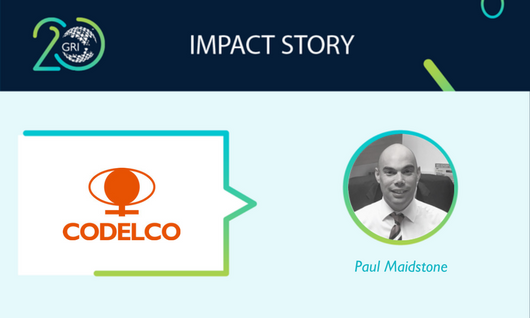Case Study: Sustainability Reporting Driving All-Round Improvement

Codelco, a state-owned mining company pioneered sustainability reporting in Chile, and has been a GRI reporter since 1999. Paul Maidstone, Corporate Director, Environmental Compliance at Codelco, talked to us about the foundational role reporting has had in driving Codelco’s sustainability journey.
Paul Maidstone: At Codelco, the depth of sustainability reporting today is at the same level of financial reporting, which is a legal requirement for state-owned companies. Over the years, it has driven us to improve and develop all aspects of sustainability: from the implementation of new policies to development of programs and strategic targets and metrics. We are convinced that any contribution to promote non-financial reporting is key to ensure the development of companies, countries, and the whole region.
What are the concrete ways sustainability reporting has impacted Codelco’s business operations?
First, sustainability reporting has helped Codelco to integrate new issues into the management agenda, emerging both from our materiality assessment process as well as from the identification of new topics in GRI’s sustainability reporting framework. It has also helped create systems and processes to generate and manage data, and to transparently communicate our performance. With the GRI framework, we are able to provide all stakeholders with an in-depth view of Codelco’s actions and contribution to the economy and well-being of Chile.
From a compliance perspective, sustainability reporting is also a tool to respond to specific commitments, the International Council on Mining and Metals’ sustainable development principles and position statements, and the UN Global Compact’s Communication on Progress.
How has Codelco’s sustainability reporting evolved throughout the years?
Codelco has been reporting its environmental and sustainability performance since before GRI’s first Reporting Guidelines were published, but GRI has since become the go-to guideline and standard for all issues relevant to our stakeholders. The main evolution for Codelco has been the expansion of the concept of sustainability. We have moved forward from the traditional view that considers the environment, community and health & safety as the three pillars for sustainability, towards a more holistic concept. Nowadays, our sustainability work is based on six dimensions: environment, communities and territory, health and safety, innovation, corporate governance and business, and people.
In terms of format, Codelco has evolved from written to digital, and from corporate aggregation to divisional reports. Our next challenge is to establish multi-channel and multi-format reports to ensure reaching our key stakeholders.
You mention human rights as one of the topics Codelco started paying more attention to after the increased focus in GRI’s reporting framework. Can you tell us more about the process?
Codelco has paid attention to human rights for quite some time. In the very beginning, the scope was unclear for us due to a national context relating human rights to the political sphere. Once human rights received increased focus in the GRI Guidelines, we got a better understanding of the intersection of business and human rights and our role in it. We then decided to include human rights in our management approach, and report how we are tackling these challenges within our operating environment.
Additionally, Chile has evolved in terms of legislation and public interest towards human rights. As a result, Codelco has become an integral part of Chile’s National Action Plan on Business and Human Rights. As a state-owned company, we believe we should set a national example, showcasing our contribution to the fight against human rights abuses.
As a veteran reporter, Codelco is expanding its role beyond producing an annual sustainability report. What does this entail?
We are continuously seeking ways to advance national plans, such as the National Public Company System (SEP), which deals with reporting practices and processes. We have established various workshops intended to help small and medium sized state-owned companies to approach sustainability reporting and fulfil their reporting commitment. We have also actively participated in local industry associations, training sessions and research in order to develop country-specific indicators. Finally, this year we took part in reviewing the translation of the GRI Sustainability Reporting Standards into Spanish, making it more accessible for companies in the Spanish-speaking world to start measuring and reporting on their corporate responsibility.
With the GRI Sustainability Reporting Standards, companies are able to unlock the transformative power of transparency, while contributing to the common sustainability agenda and reaping the benefits of increased stakeholder trust. Visit the GRI 20th Anniversary hub for more impact stories, and join the effort to create a sustainable global economy.

